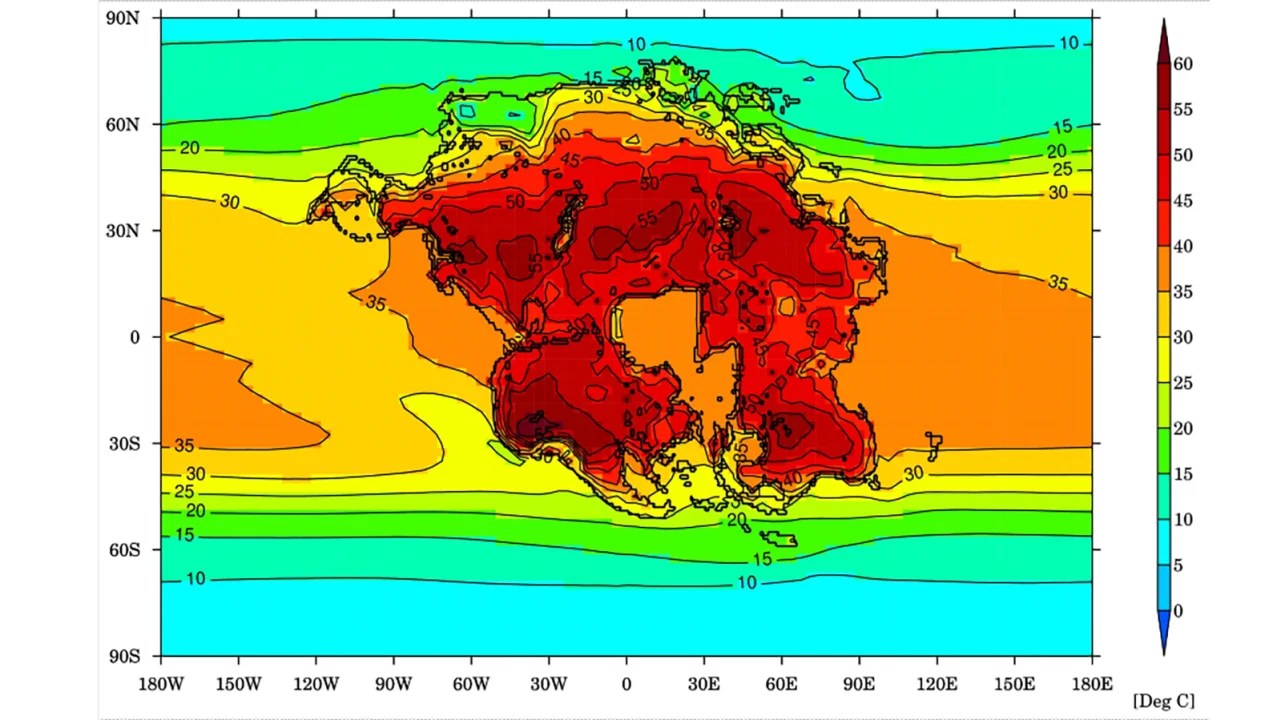(CNN) — Researchers have predicted that the formation of a new “supercontinent” could wipe out humans and all other mammals still alive within 250 million years.
Using the first supercomputer climate models of the far future, scientists at the University of Bristol in the UK have predicted how extreme climate events will intensify after the world’s continents merge to form a supercontinent, Pangea Ultima, in about 250 million years.
They found that the atmosphere would be extremely hot, dry and almost uninhabitable for humans and mammals, which have not evolved to handle prolonged exposure to extreme heat.
The researchers simulated trends in temperature, wind, precipitation and humidity on the supercontinent and used models of plate tectonics, ocean chemistry and biology to calculate carbon dioxide levels.
They found that the formation of Pangea Ultima would not only lead to more regular volcanic eruptions, spewing carbon dioxide into the atmosphere and warming the planet, but the Sun would also become brighter, emit more energy and further warm the Earth. The experts said. The article was published on Monday in the magazine Natural earth sciences.
“A newly emerging supercontinent would create a triple whammy including a continental effect, a hotter sun and more carbon dioxide in the atmosphere,” Alexander Farnsworth, senior research associate at the University of Bristol and lead author of the study, said in a statement on Monday. . .
“Widespread temperatures of 40-50°C and even higher daily maximum temperatures, exacerbated by high levels of humidity, would ultimately determine our fate,” Farnsworth added. “Humans will die – along with many species.” The other – due to their inability to get rid of this heat through sweat, which cools their bodies.”
Farnsworth noted that increased heat would create an environment devoid of food or water sources for mammals.
This image shows the geography of the Earth today and the expected geography of the Earth 250 million years from now, when all the continents will converge into one supercontinent.
While there is significant uncertainty in predicting the future so far, scientists said the outlook looks “very bleak”, with only 8% to 16% of the supercontinent being habitable for mammals.
Carbon dioxide could double current levels, according to the report, although this calculation was made on the assumption that humans would stop burning fossil fuels now, “otherwise we would see these numbers much sooner,” Benjamin Mills said in a statement. Professor of Earth System Evolution at the University of Leeds and co-author of the report.
The report’s authors warn that this bleak outlook is no excuse for complacency when it comes to tackling the current climate crisis. Human-caused climate change already causes millions of deaths around the world every year.
“It is extremely important that we do not lose sight of our current climate crisis, which is a result of human greenhouse gas emissions,” co-author Eunice Lu, a climate change and health researcher at the University of Bristol, said in the statement.
“While we expect the planet to be uninhabitable within 250 million years, today we are already seeing extreme heat that is harmful to human health. This is why it is important to achieve net-zero emissions as soon as possible,” Lu added.
Climate change is on track to transform life on Earth, and billions of people and other species will reach points where they can no longer adapt unless global warming is dramatically slowed, according to a major UN-backed report published last year.
Scientists have warned for decades that temperature rises need to remain below 1.5°C above pre-industrial levels, rapidly closing the window to reduce our dependence on fossil fuels and avoid catastrophic changes that alter life as we know it.
The last mass extinction occurred about 66 million years ago, when an asteroid struck Earth and wiped out the dinosaurs and most life on the planet.
With reports from CNN’s Angela Fritz, Rachel Ramirez and Laura Baddison.

“Proud web fanatic. Subtly charming twitter geek. Reader. Internet trailblazer. Music buff.”


:quality(85)/cloudfront-us-east-1.images.arcpublishing.com/infobae/LBIVO7473VDJVIOHOP577YLWDU.jpg)



More Stories
HONOR Magic6 Pro shows its power and quality against the Samsung Galaxy S24 Ultra
NASA has captured images of the famous horse-shaped nebula in unprecedented detail
WhatsApp will stop working from May 1 on these mobile phones